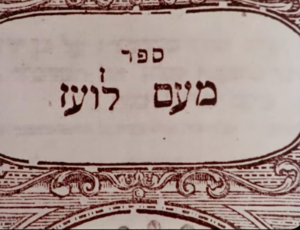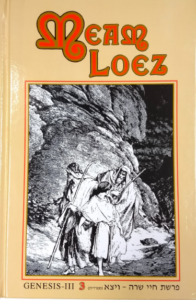Meam Loez
Rabbi Culi and
|

|
The Me’am Loez was one of the first major Ladino works following the expulsion of the Jews from Spain.
As many of the Jews settled within the Ottoman empire, the comprehension and scholarship of Hebrew texts among the masses decreased. Rabbi Yaacov Culi was a Talmudist and biblical commentator who was from an exiled Sephardic family. Born in Jerusalem in 1689, he later moved to Constantinople where he worked and studied with the Rabbi Yehuda Rozanis (the Mishneh LaMelech) who was then the chief Rabbi of Constantinople. 
In order to bring Judaism to the masses, Rabbi Culi took it upon himself to compose a commentary on the Torah written entirely in Ladino. Written in 1730, the Me’am Loez has biblical commentaries as well as extracts from the Talmud, Midrash, Zohar and Mishnah. Written in an unprententious and accessible style, the Me’am Loez dealt with all aspects of life including the weekly Torah portion, history, ethics and philosophy. In Turkey, the printing of the work was done a few pages at a time and distributed before Shabbat, then bound when the volumes were complete. Rabbi Culi died in 1732 shortly before publishing his commentary on Shemot. Because of the overwhelming populatiry of Me’am Loez, other prominent Rabbis in Turkey took over the endeavor and completed the remaining volumes. The Me’am Loez, although written for the common man, is considered the greatest Ladino work ever compiled. Many Sephardic families would gift a new son-in-law the expensive set much like a Shas is gifted today. With the decline of Ladino after the Holocaust, various translation were produced. The first Hebrew translation was by Rabbi Shmuel Yerushalmi in 1950. The first English translation (The Torah Anthology) was written by Rabbi Aryeh Kaplan around 1980.
Rabbi Aryeh Kaplan
Rabbi Aryeh Kaplan was a Sephardic Jew whose paternal line was from Salonika, Greece.  His grandfather’s original last name was Carmona but was changed to Kaplan after immigrating to America. A prolific author, Rabbi Kaplan took it upon himself the monumental effort of translating the entire set of the Me’am Loez to English. Rabbi Kaplan finished translating 18 volumes of the commentary but sadly died in 1983 just three volumes shy of completion. Although Rabbi Shmuel Yerushalmi’s Hebrew translation already existed, Rabbi Kaplan determined that it wasn’t faithful enough to the original Ladino text and translated his English edition to match the original Culi version in Ladino. “The Torah Anthology” is now a 45 volume set and is published by Moznaim publications.
His grandfather’s original last name was Carmona but was changed to Kaplan after immigrating to America. A prolific author, Rabbi Kaplan took it upon himself the monumental effort of translating the entire set of the Me’am Loez to English. Rabbi Kaplan finished translating 18 volumes of the commentary but sadly died in 1983 just three volumes shy of completion. Although Rabbi Shmuel Yerushalmi’s Hebrew translation already existed, Rabbi Kaplan determined that it wasn’t faithful enough to the original Ladino text and translated his English edition to match the original Culi version in Ladino. “The Torah Anthology” is now a 45 volume set and is published by Moznaim publications.
